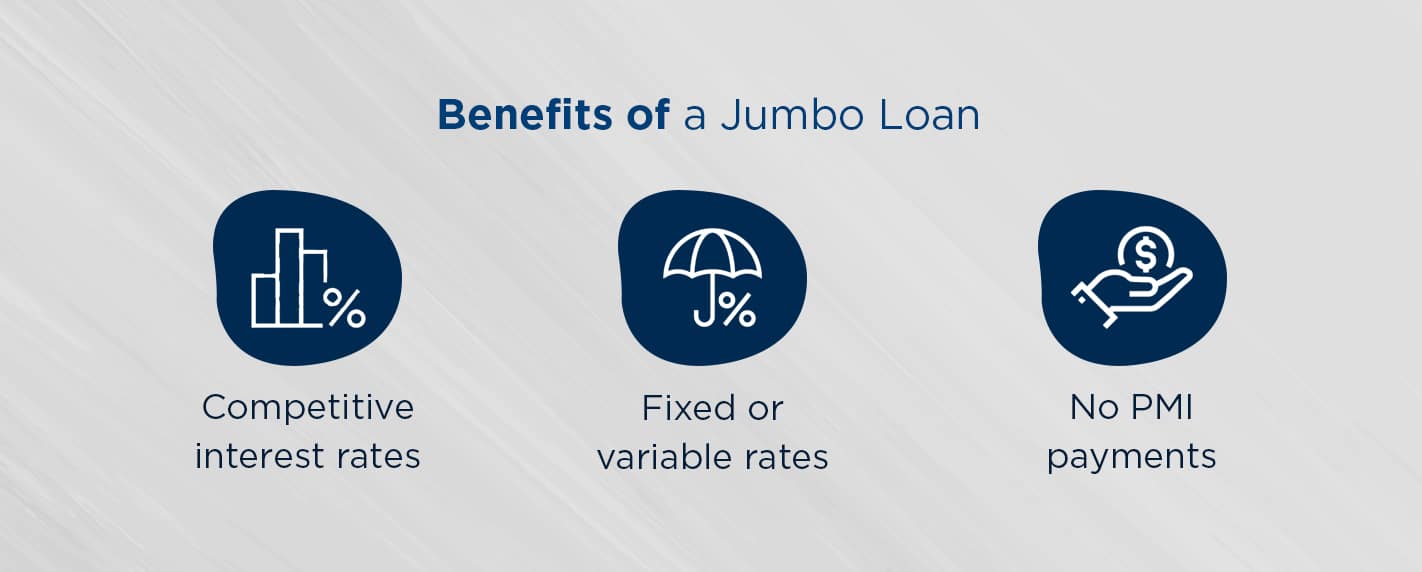Comprehending Jumbo Loan: What You Required to Know for Deluxe Home Purchases
The Effect of Jumbo Fundings on Your Financing Alternatives: What You Required to Know Before Using
Jumbo lendings can play a pivotal function in shaping your financing options, particularly when it concerns obtaining high-value residential or commercial properties. While they offer the possibility for bigger financing amounts without the worry of exclusive mortgage insurance policy (PMI), they also include strict certification standards that call for cautious factor to consider. Comprehending the equilibrium between the difficulties and advantages presented by these finances is crucial for possible borrowers. As you consider your alternatives, the effects of interest prices and item schedule might prompt you to reassess your financial approach moving on (jumbo loan).
Understanding Jumbo Loans
Comprehending Jumbo Loans requires a clear grasp of their distinct attributes and demands. Jumbo fundings are a type of mortgage that goes beyond the adhering financing limitations developed by the Federal Real Estate Money Agency (FHFA) These limits differ by area but typically cap at $647,200 in most areas, making jumbo financings necessary for funding higher-priced residential or commercial properties.
Among the defining features of big fundings is that they are not qualified for purchase by Fannie Mae or Freddie Mac, which results in stricter underwriting guidelines. Debtors need to usually demonstrate a higher credit report, typically above 700, and supply significant paperwork of revenue and assets. Additionally, lending institutions may require a bigger down payment-- commonly 20% or even more-- to reduce danger.
Rates of interest on jumbo loans can be somewhat higher than those for adjusting car loans as a result of the increased risk assumed by the lender. Nonetheless, the absence of personal home mortgage insurance coverage (PMI) can counter a few of these prices. Recognizing these factors is vital for potential customers, as they considerably influence the terms and usefulness of protecting a jumbo funding in today's affordable realty market.
Benefits of Jumbo Financings
Jumbo finances offer distinct benefits for buyers looking for to purchase high-value residential or commercial properties that go beyond standard finance restrictions. Among the key advantages of big loans is their capacity to fund larger quantities, allowing purchasers to get homes in costs markets without the constraints enforced by adapting loan limitations - jumbo loan. This flexibility makes it possible for buyers to view a more comprehensive range of residential properties that might better match their needs and preferences
Additionally, big car loans typically come with competitive rates of interest, particularly for customers with solid credit report profiles. This can bring about considerable savings over the life of the financing, making homeownership extra economical in the lengthy run. Furthermore, big financings can be tailored to suit private economic scenarios, offering different terms and amortization alternatives that line up with the debtor's purposes.

Challenges of Jumbo Lendings
Browsing the complexities of jumbo loans provides numerous difficulties that possible borrowers need to recognize before proceeding. One considerable hurdle is the rigorous lending requirements enforced by banks. Unlike adhering loans, big finances are not backed by government-sponsored business, leading lending institutions to take on even more extensive criteria. This often consists of higher credit rating rating needs and considerable paperwork to confirm earnings and properties (jumbo loan).
In addition, big fundings generally include greater rate of interest compared to traditional finances. This elevated expense can significantly impact monthly repayments and overall affordability, making it essential for debtors to carefully examine their economic scenario. Furthermore, the deposit demands for jumbo lendings can be considerable, usually ranging from 10% to 20% or more, which can be a barrier for many possible home owners.
One more obstacle depends on the minimal accessibility of jumbo lending products, as not all lending institutions use them. This can result in a decreased swimming pool of choices, making it critical for customers to perform thorough research study and potentially look for specialized lenders. On the whole, understanding these obstacles is crucial for anyone taking into consideration a big financing, as it ensures enlightened decision-making and better financial planning.
Qualification Standards
For those considering a jumbo funding, fulfilling the certification standards is a crucial action in the application process. Unlike conventional finances, big financings are not backed by federal government companies, leading to stricter requirements.
First of all, a solid credit history is vital; most lenders require a minimum rating of 700. A higher rating not only increases your chances of authorization yet might additionally safeguard better rate of interest. Additionally, customers are typically anticipated to demonstrate a significant revenue to ensure they can conveniently take care of greater month-to-month payments. A debt-to-income see here (DTI) proportion below 43% is normally chosen, with reduced ratios being a lot more beneficial.
Deposit demands for jumbo car loans are additionally considerable. Consumers ought to prepare for putting down a minimum of 20% of the residential or commercial property's purchase price, although some lending institutions may use alternatives as low as 10%. Showing cash reserves is vital; lending institutions frequently need evidence of enough liquid assets to cover a number of months' well worth of home mortgage settlements.
Comparing Financing Choices
When reviewing funding options for high-value properties, understanding the differences between numerous finance kinds is essential. Jumbo fundings, which surpass conforming loan limitations, normally featured more stringent certifications and greater rates of interest than conventional car loans. These loans are not backed by government-sponsored enterprises, which increases the lender's risk and can bring about more rigorous underwriting criteria.
On the other hand, traditional finances use more flexibility and are usually less complicated to get for debtors with solid credit history accounts. They may come with lower rate of interest and a bigger selection of choices, such as repaired or adjustable-rate home loans. Additionally, government-backed loans, like FHA or VA car loans, give possibilities for lower deposits and even more tolerant credit report requirements, though they likewise impose restrictions on the finance amounts.

Conclusion
In final thought, jumbo finances existing both possibilities and challenges for potential buyers looking for financing for high-value residential properties. While these fundings permit bigger amounts without the burden of private home loan insurance coverage, they include rigid certification demands and prospective disadvantages such as higher rate of interest. An extensive understanding of the benefits and challenges related to big finances is necessary for making educated decisions that align with long-term economic objectives and goals in the realty market.
